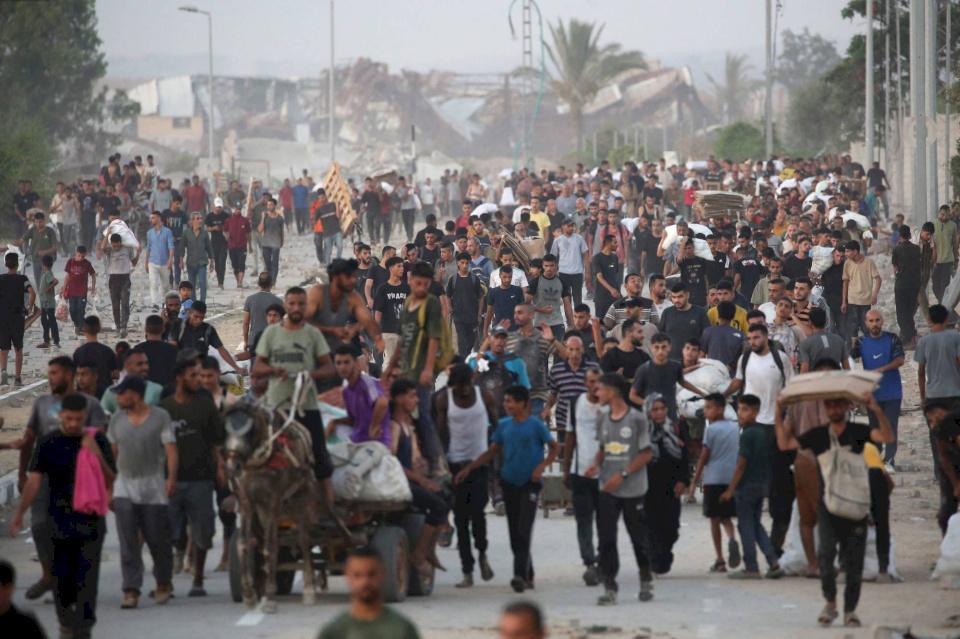
"Empty Pockets".. Gaza between the Joy of Falling Commodity Prices in Markets and Tight Liquidity
Special Economy Sada- The markets in the Gaza Strip are witnessing a remarkable economic transformation, with a noticeable drop in the prices of most essential goods, due to the recent entry of quantities of goods into the sector through merchants.
This drop, which residents described as a "joy akin to the end of the war," resulted from fierce competition among traders and thieves of goods who offered their products at lower prices, leading to a collective decline in prices, especially for basic food items.
Among the most notable goods that have seen a decline is flour, with the price per kilo dropping to between 10 and 13 shekels.
Additionally, the price of oil (cooking oil) currently ranges between 27 and 30 shekels per liter, while sugar is sold for about 45 to 50 shekels per kilo.
The price of "Feta" cheese dropped from 25 shekels to only 10 shekels for a box within one day, as it had not entered Gaza for months, while the residents are longing to consume dairy products and cheese.
As for vegetables, prices have reached the following: tomatoes: 50–60 shekels per kilo, potatoes: 40–45 shekels per kilo, cucumbers: 40–45 shekels per kilo.
Incomplete Joy Due to Liquidity Crisis
Despite this relative easing in prices, the cash liquidity crisis still casts a heavy shadow over citizens' lives, with the liquidity shortage reaching a significant level. This reality has left many unable to fully benefit from the price drops, especially under the continued imposition of high fees by cash traders, reaching up to 55% on cash withdrawal operations, which adds an extra burden on citizens.
Additionally, some traders impose different prices on customers who pay via their bank cards, often higher than the cash price, complicating the economic scene further.
Political and Economic Backgrounds
In light of this economic chaos, observers believe that Israel seeks to push citizens towards the option of "voluntary migration," thus employing all available means to tighten living conditions for them.
Experts indicate that these policies are not isolated from broader strategic objectives aimed at reshaping the demographic reality in the sector, by pushing residents towards migration as a forced, rather than voluntary, option. As unemployment rates increase, poverty levels rise, and the liquidity crisis worsens, the idea of leaving becomes more acceptable to a wide range of youth and families.
Moreover, manipulation of commodity prices and allowing the market to be prone to chaos among traders and thieves of goods reflects the absence of any actual economic control, contributing to the deepening feeling of instability. This fragile economic reality, amid ongoing security threats, makes daily life in Gaza a battle for survival, not just mere living challenges.
In this context, some believe that what is happening is not merely a transient economic crisis, but part of a policy of "social engineering" aimed at gradually emptying the sector of its residents through economic and psychological pressure, without the need for forcible deportations.

Injuries and Arrests in Israeli Raids in the West Bank and Jerusalem

Wetkow meets Netanyahu and senior officials as Tel Aviv presents its demands to the United...

Rising Tensions Between the United States and Iran in the Strait of Hormuz and the Arabian...

Saudi Arabia Emphasizes Condemnation of Israeli Violations in Gaza

In Pictures: Details of the Verdict Issued Against Nazmi Muhanna and His Wife

ردًا على نتنياهو.. لجنة إدارة غزة: نعمل على اختبار تصورات بصرية لهوية مؤسساتنا

The occupation releases a batch of prisoners from Gaza

